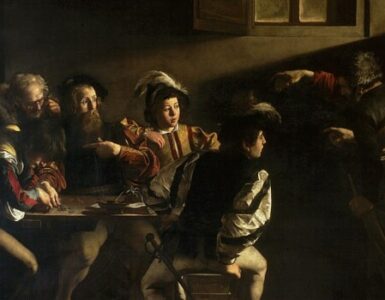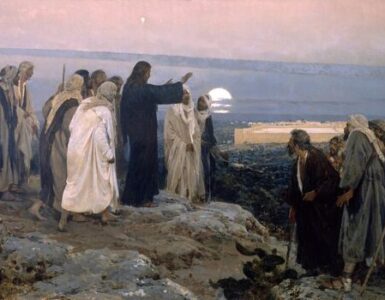Robert Frost could arguably be called “America’s Poet.” His poems are usually quite brief, and they are metered in simple rhyming verse. Both these qualities make his poetry easier to read, recite, and understand. The fact that Frost’s poetry is basic and popular makes it ripe for our consideration here in this series on Catholic themes in American literature.
Most of Frost’s poetry, especially his best-known poems, were written in the first half of the twentieth century, a time of war, social upheaval, and seismic cultural transformation. In the midst of this, Frost’s biographical details reveal that he was basically a nominal Christian and not more. Yet, his poetry is pervaded by idyllic scenes of natural beauty along with clear and detailed images and words that allow us to deeply examine our psychological and spiritual states throughout life. Here, I will consider just two of his earliest poems, “Reluctance” and “The Road Not Taken.”
“Reluctance,” published in 1913, is a stunning opportunity for meditation on the changing seasons of life. The poem opens with the narrator describing distant travels through field and wood, climbing hills to look at the world. The narrator has reached the term of those experiences: “I have come by the highway home, / And lo, it is ended.” The next stanzas paint a bleak, dreary scene. “The leaves are all dead on the ground,” except a few that will later “go scraping and creeping.” “The last lone aster is gone; / The flowers of the witch hazel wither.” There seems to be no excitement, hope, or joy remaining.
We all come to psychological and spiritual moments like this one. Whether it is after a vacation, after a period of schooling, at the end of a career, or as our children grow into new seasons of their own lives, all of us struggle with allowing one chapter to be closed and another chapter to begin. It is easy for us to look backward and become despondent.
The key lines of the poem are contained at the end of the third stanza.
The heart is still aching to seek,
But the feet question ‘Wither?’
A heart aches because it desires something, hopes for something that it does not have, even temporarily, or cannot achieve. How frequently our hearts ache for something more and deeper! The question is: How do we fill those aches?
The final stanza brings us to the personal, moral, and spiritual response the author wants us to consider. It is a treason, a betrayal of the heart, the narrator tells us, “To go with the drift of things” or “To yield with a grace to reason” by accepting the end of a season of life. But, yield to that grace of reason we must, as it is the only way to keep from despair.
This last thought might cause a reader to think of two statements Jesus made during His public ministry. Speaking of the movement of the Holy Spirit in the life of a disciple, Our Lord said, “The wind blows where it wishes, and you hear its sound, but you do not know where it comes from or where it goes. So it is with everyone who is born of the Spirit” (Jn. 3:8). Rebuking the Pharisees for focusing on superficial circumstances, He taught, “You know how to interpret the appearance of the sky, but you cannot interpret the signs of the times” (Mt. 16:3). The Holy Spirit will move us to new, more fulfilling places, if only we will not cling to our easy rationalizations.
Just a few years after “Reluctance,” Frost published “The Road Not Taken,” perhaps his best-known poem. It seems that many readers initially think the poem is about blazing one’s own unique path and being different from “the mainstream.” However, a deeper consideration leads to the realization that this poem also is about discernment, choices, and moving on from closed doors.
The first line brings the reader with the author to a decision point in “a yellow wood.” Throughout literary history, woods and forests have symbolized confusion, lost direction, and even barriers to right understanding. In Frost’s poem, the forest is yellow, which quite probably symbolizes indecision. This becomes explicit when we read, “And sorry I could not travel both / And be one traveler, long I stood…” This, of course, causes Jesus’ words about the wide and the narrow roads to echo in our minds and hearts (cf. Mt. 7:13-14). Which road will I choose?
The narrator provides a bit of reflection on the reasoning behind his decision, or lack thereof. One path had the “better claim” because it offered hopeful new experiences: “Because it was grassy and wanted wear…” Yet, in the next lines, we read that both paths had been worn “really about the same, / And both that morning equally lay…” The narrator admits that both paths were basically equal. This is frequently a consideration in our decision-making: both choices probably have quite a few benefits, and both probably have at least a few negative aspects. And so we hesitate or vacillate.
At this point, the narrator admits the pivotal thought for the poem. “Oh, I kept the first for another day,” Frost exclaims. In making his decision, he wants to keep his options open; he wants to be able to choose the other, at some point, if the first is not quite what he expects, or if it does not pan out. Indeed, it is a thought too many of us have about making our own decisions. We seem to abhor closed doors; we want to keep our options open. If a path does not lead to an expected or desirable destination, we reserve the right to a proverbial do-over.
The narrator continues to work out his quandary. He recognizes a certain finality to his decisions: “Yet knowing how way leads on to way, / I doubted if I should ever come back.” But, he doesn’t exactly like the idea: “I shall be telling this with a sigh / Somewhere ages and ages hence….” The narrator has expressed as a forethought the same lament many of us have about the thing(s) we should have said or done; the place(s) we should have gone; the people we should have engaged.
At the end of the poem, the narrator acknowledges the benefit of decision over indecision. “I took the one less traveled by, / And that has made all the difference.” The narrator accepts the finality of his decision, and the impact it has had on his life. In a world full of seemingly infinite options, and a culture that tells us we must have them all, without struggle, the road less traveled is to choose paths and close doors that don’t lead us to deeper spiritual fulfillment and joy. Even less traveled is the decision to find peace in those choices, regardless of happenstance.
All of this brings us to the concepts of abandonment (indifference, in Ignatian terms) and discernment. As one season of life comes to an end, it is natural for a person to desire more of the same or similar circumstances. As we face decisions, we wish that closed doors were not required. We ache, we sigh, longing to find those feelings again, or hoping for different circumstances. Yet, in this, we are given an opportunity to abandon ourselves into God’s providential hands, reading the signs of new times, and going wither the Holy Spirit leads us instead of being saddened by the end of a previous season or disappointed by a closed door.
These two poems from Frost’s early career offer readers an opportunity to ponder some of the most significant and perplexing questions of the human spirit, especially about finding and choosing God’s will. While they are not explicitly religious, they help us to understand that something deeper and more certain than fantastic experiences and a plethora of options is necessary for a fulfilled life. Thus, the poems become prayer, opening up a conversation with God about what we believe and how we should act; about how He is providing grace to purify and transform the mind and spirit.
Let’s all work to unreluctantly take the narrow road.
Photo by Yasintha Perera on Unsplash










